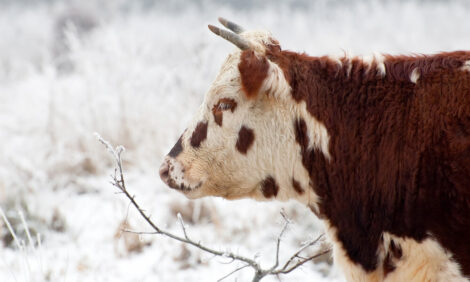



Scottish Producers Alerted to Brazilian Trade Restrictions
SCOTLAND - The removal of trade restrictions on imports of Brazilian beef would almost certainly result in Scottish producers receiving lower and more volatile prices, according to Quality Meat Scotland’s Head of Economics Services, Stuart Ashworth.
Speaking at an “EU Imports and CAP” seminar in Bridge of Allan yesterday (Tuesday, January 22nd) Mr Ashworth reminded producers of the background to the current trade restrictions with Brazil.
“Initial restrictions on Brazilian trade with the UK and Europe were applied in 2008 because Brazil could not provide sufficient guarantees on product safety. In simple terms, Brazil could only supply Europe from an authorised list of approved cattle farms,” said Mr Ashworth.
“Not surprisingly UK imports from Brazil fell 80 per cent between 2007 and 2008 and continued to fall through until 2011. During 2012, however, imports doubled but still remain about 85 per cent lower than in 2007.”
In addition to the approved farm requirement, the European market is also shielded as a result of significant import tariffs. For boneless beef, which is what Brazil currently supplies, this can be as much as £2500 per tonne plus 12.8 per cent of the offer price, said Mr Ashworth.
“So offering someone beef at £4000 per tonne would result in a tariff paid price of over £7,000 per tonne. Even within the terms of the limited number of reduced tariff quotas the reduced tariff of 20 per cent of offer price would mean a £4,000 per tonne product being imported at £4,800 per tonne which is still significantly less than the full tariff paid price.”
According to Mr Ashworth it looks unlikely that under current trade arrangements Brazil will be able to, or even wish to, supply increased quantities of beef to the UK or Europe.
However he told producers at the event, organized by the Scottish Beef Cattle Association, the NBA (Scotland) and the NSA (Scotland), that there was little doubt Brazil would like these tariffs reduced either through WTO, Mercosur or bilateral agreements.
There would be several impacts on Scottish producers, he said, if this trade restriction is removed.
“Clearly the first point of contention is that Brazilian beef would be available at much reduced prices. Irrespective of what the world price is, by removing customs duties the product would become cheaper. It would also be highly likely that this ‘cheaper product’ would be at world prices which are currently lower than European producer prices,” said Mr Ashworth.
“A second impact would emerge from exporting nations ‘cherry picking’ what they supply around the globe - choosing the highest value market for each different cut. The consequence of this for the importing nation with whole carcases to sell is that the overall ‘carcase balance’ in the market changes and individual carcase realisation values come under pressure.”
However, Mr Ashworth emphasized that just because trade barriers have been removed it does not mean that trade will take place.
“That would depend on the relative state of the global demand for beef and if the main demand lies outside the European Union then that is where trade will take place.
“Nevertheless, it is inevitable that Scottish producer prices would move closer to world market prices, although they are still likely to retain a premium built on product quality and provenance.”
Mr Ashworth said it is likely there would be greater volatility in prices reflecting global trading conditions in respect of supply and demand and exchange rate movements between major trading partners.
“For example, during 2010 and into early 2011 the gap in beef prices between the major global beef exporters and Europe narrowed significantly. However, as 2011 passed into 2012 and the global economy slowed down the gap has widened again.
“It is therefore impossible to say with certainty what a greater volume of Brazilian beef on the European market would do for Scottish producer prices. However, it is almost certain that it would lead to lower farm gate prices and greater volatility in those prices.”
TheCattleSite News Desk


